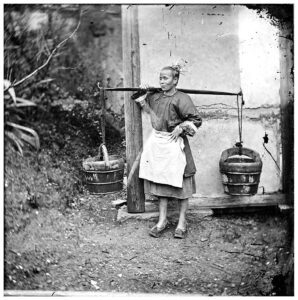
Image: Archduke Ferdinand of Austria. By
Ferdinand Schmutzer. Wikimedia Commons
30 Weirdest Historical Events That Will Make You Laugh
Sometimes you find yourself researching the most bizarre things, from bizarre royal customs to some of the most peculiar scientific discoveries, the past is loaded up with the absolute strangest occasions that you’ll at some point run into.
In this article, we’ll be investigating the absolute most clever, most odd historical events that will make you laugh uncontrollably. From weird regulations to unconventional innovations, you will have a hard time believing how wild the past can be. So, get ready for some seriously weird historical events.
1. In 1914, an English man endeavored to cross the English Chanel in a bath

Image: Bath Tub. By Unknown. Wikimedia Commons
In 1914, an English man named William Trubshaw endeavored to cross the English Direct in a bath. He was furnished with only an oar and a lifejacket and set out from the French port of Boulogne-sur-Mer. sadly, he wasn’t effective in his endeavor and had to leave the excursion after a couple of hours because of the terrible climate and ocean conditions. Regardless of his disappointment, Trubshaw pointed out a ton of the accomplishment and earned a little respect for his boldness and assurance. His endeavor was a sign of the force of the English Channel and the fortitude of the people who have considered crossing it.
2. The Incomparable Emu War

Image: A man holding an emu killed by Australian soldiers. By Unknown. Wikimedia Commons
The Incomparable Emu Battle of 1932 was a natural life for the executive’s military activity in Western Australia. The Australian military was dispatched to winnow an enormous populace of emus that were obliterating crops and harming the framework nearby. The conflict went on for a very long time and regardless of the tactical’s earnest attempts, the emus ended up being a lot for them. The military needed to fall back on non-deadly techniques, for example, fencing and hunting with shotguns to lessen the emu populace. The conflict was at last pronounced a disappointment, with the emus eventually winning the conflict.
3. An improbable auto collision
In 1895, the whole territory of Ohio was a very different spot than it is today. Truth be told, there were just two vehicles out and about in the whole state. Sadly, these two vehicles wound up colliding with one another, making it presumably the primary fender bender in the state. This occurrence was an indication of how much innovation has changed and keeps on changing the scene of transportation.
4. The principal recorded episodes of ‘mooning’
The first morning during the Fourth Campaign is remembered to have happened around 1203. The story goes that a French knight, Robert de Clari, was caught by the Venetians and taken to a pinnacle in Constantinople. In the wake of being denied passage to the city, a gathering of French knights continued to accumulate around the pinnacle and counterfeit the Venetians by showing their bare bottoms. This demonstration of rebellion was viewed as an indication of a lack of respect and embarrassment and has thusly been known as the first morning of the Fourth Campaign. It is said that the Venetians were so humiliated by the sight that they permitted the knights to enter the city.
5. Don’t touch the columns
In 1821, the Turks ran low on projectiles during the Greek Conflict of Autonomy and chose to bring down the marble segments of the Parthenon in Athens. The marble was then used to assemble new strongholds around the Acropolis, with the end goal to shield the city from the Greek progressives. This activity was viewed as an incredible misfortune by a lot of people, as it was an image of the city’s brilliant past. This demonstration of obliteration likewise caused a lot of outrage and hatred among the Greeks, who felt that the excellence of their city had been profaned. Right up until now, the Parthenon stays a sign of the excellence and force of the old Greeks.
6. The demise of Archduke Ferdinand of Austria
Archduke Franz Ferdinand of Austria, beneficiary to the Austro-Hungarian throne, was killed on June 28, 1914, in Sarajevo, Bosnia. He was shot in the neck and midsection by 19-year-old Gavrilo Princip, a Bosnian Serb, and individual from the Dark Hand, a Serbian patriot association. Gavrilo Princip was having breakfast at a bistro close to the Latin Extension in Sarajevo shortly before he killed Archduke Franz Ferdinand of Austria. He had been trusting that the Archduke will pass by so he could attempt to take his life, and he did.
7. In 1906, a gathering of English ladies endeavored to fly the English Chanel in a sight-seeing balloon and wound up in France
In 1906, a gathering of English ladies, driven by Emily Shipton, endeavored to fly the English Direct in a sight-seeing balloon. The flight started in London and was the first of its sort. Sadly, high breezes and terrible weather conditions made the inflatable float off-kilter and the ladies in the end wound up in France, having gone more than 200 miles. Regardless of the ineffective endeavor, the ladies got a warm greeting from their French and were lauded for their gallant exertion. The occasion stood out as truly newsworthy all over the planet and the ladies were commended for their courage and spearheading soul.
8. In 1872, an English boat named The Mary Celeste was found deserted in the Atlantic Sea with nobody on board
It had left the port of New York City on November seventh and was spotted by one more boat on December fourth, however, nobody was ready. Everybody and everything had evaporated, leaving just the actual boat with its freight and group supplies unblemished. The secret regarding what befell Mary Celeste and its group has never been addressed. Different speculations have been proposed, going from a privateer assault to a waterspout. Some accept the team terrified and deserted the boat in the feeling of dread toward a fire, while others accept it was crafted by an otherworldly occasion. Anything that the reason, the strange vanishing of Mary Celeste has been an entertaining wellspring of interest for the majority for almost 150 years.
9. In 1867, The US bought The Frozen North from Russia for $7.2 million
The Frozen North Buy was a huge crossroads in history as it denoted whenever the US first bought land from another country. The buy dramatically increased the size of the US and gave the nation admittance to an abundance of undiscovered normal assets. It likewise opened up new exchanging open doors between the two countries and considered the development of the US into the far north. Albeit the buy was seen by some as a questionable choice at that point, it has since been demonstrated to be a savvy move that has helped the two nations.
10. In 1790, the French government offered an award of 12,000 francs for anybody who could concoct a method for utilizing human or creature waste to deliver energy
This was a progressive idea at that point, as it would give a method for producing energy from a formerly ignored asset. This prize was a significant impetus for researchers and creators to investigate the capability of waste as an energy source. The award was won by a man named Nicolas Cugnot, who developed a steam-fueled vehicle controlled by consuming creature squander. This innovation was the antecedent to current motors and demonstrated that waste could to be sure be utilized to produce energy.
11. The one who tossed the explosive that exploded the vehicle behind Franz Ferdinand didn’t have the foggiest idea about the projectile and had a 10-second clock.
He took the cyanide provided by the Dark Hand to commit suicide after the endeavor, and it lapsed, so he just wound up hurling a bundle. To “get it done” of death, he bounced into a close-by channel that was just two inches down. It didn’t turn out so perfectly for him.
12. In WWII, two besieging units were sent by Americans to a similar area to bomb it.
But one of them unintentionally showed up a great many feet a step down about the next one. Neither of them saw each other until they had proactively begun bombarding. Inexplicably, the lower planes were not hit by the higher planes, and the Germans generally thought they had concocted a brilliant besieging technique to bomb a region two times so a lot.
13. During the WW2, in the Skirmish of Crete where the New Zealand Maori contingent stayed confronting a German unit in a plantation
The Germans figured they would attempt to scare the foe by having their leaders holler out the request to ‘fix pikes’ in readiness for a blade charge. Point when the Maori heard this they began cheering. The Germans chose not to charge and unobtrusively withdrew. The name Māori was very nearly a dictum with the English Troopers. Their consistent pike charges and the destruction they caused among the Germans with cold steel procured them the name of the ‘Blade Men.’
14. Tourment of a Roman ruler
Caligula, the Roman Ruler, once held a huge gathering exclusively for a reason to tell the chaperons, that assuming he needed he can have them generally killed. Then, at that point, excused the gathering.
15. America’s seventh president Andrew Jackson’s Foul Fowl
Burial service participant Fire up. William Menefee Norment stated, “Before the lesson and keeping in mind that the group was gathering, a mischievous parrot that was a family pet, got energized and started swearing so clearly and long as to upset individuals and must be conveyed from the house.
See also Top 10 facts about Andrew Jackson
16. During World War 2, Russia used dogs that were strapped with bombs to destroy enemy tanks

Image: Anti-tank dogs. By unknown. Wikimedia Commons
In 1935, tank canine units were authoritatively remembered for the Laborers’ and Workers’ Red Armed forces. The first thought was for a canine to convey a bomb lashed to its body, and arrive at a particular static objective. The canine would then deliver the bomb by pulling with its teeth a self-delivering belt and return to the administrator.
17. Lord Pyrrhus of Epirus’ unusual demise.
In 272 BC, he was matter-of-factly killed in a road battle in Argos when he was hit on the head by a rooftop tile tossed by the mother of a fighter he was going to strike down. It took him out and permitted an aggressor to complete him.
18. The medieval times were not putrid
The Medieval times were a period of tremendous development and change across Europe, and keeping in mind that many individuals envision the time to have been a rank and messy time, this isn’t be guaranteed to valid. While the facts confirm that the advances made in cleanliness during the period were not as progressed as they seem to be today, it is feasible to find proof that neatness was as yet critical to individuals. For instance, many individuals during this time utilized public bathhouses, and the affluent approached their confidential showers. Individuals likewise utilized clothing tubs and laundresses to keep their garments clean, and various spices were utilized in cleaning also.
19. Caligula, the Roman Emperor, waged war against Poseidon. He led 10,000 soldiers to the sea and ordered them to stab it with spears.

Image:
Caligula depositing the Ashes of his Mother and Brother in the Tomb of his Ancestors. By Unknown. Wikimedia Commons
20. President Jimmy Carter was attacked by a giant swimming rabbit in 1979
President Jimmy Carter was fishing in his old neighborhood of Fields, Georgia, on April 20, 1979, alone in a level-lined boat while the staff was ashore close by. Carter said a hare being pursued by dogs “hopped in the water and swam toward my boat.
21. Tea was stored in a safe

Image: Tea Box. By Hannes Grobe. Wikimedia Commons
Before, individuals used to store their tea in a locked cabinet to safeguard it from bugs and other ecological variables. This was finished by putting the tea in a firmly fixed holder or container and afterward locking it with a key. Individuals would likewise utilize wax or string to additional save the tea from being opened. This guaranteed that the tea stayed new and tasty as far as might be feasible. Also, this training was utilized to get the tea far from youngsters as well as to forestall robbery. At times, the tea was kept in a protected box with a lock.
22. There was a period of no Christmas celebration in Britain
England once had a restriction on Christmas that endured very nearly 400 years. This boycott was authorized by the Puritan Parliament from 1647 to 1660 during the English Nationwide conflict. During this time, the festival of Christmas was made unlawful and the people who took part in the celebrations were rebuffed. All types of Christmas festivity, including enriching, devouring, and present giving was banned and individuals who wouldn’t agree were fined or even detained. Albeit this boycott was in the end lifted, it lastingly affected the English public’s disposition towards Christmas.
23. Napoleon’s guards were responsible for his short appearance
Napoleon is in many cases considered to be short, however, in actuality, he was of normal level for his time. He remained at 5’7″, which was a typical level for men of the eighteenth and nineteenth hundreds years. Napoleon’s level was in many cases overstated by his adversaries trying to lessen his power and strength. This confusion is probably because of the way that he was encircled by a lot of taller men, as his gatekeeper was made up of men who were more than six feet tall.
24. English Kings often died on the toilet
Ruler George II passed on the latrine in 1760 after experiencing a serious assault of circulatory trouble. Lord Charles II additionally passed on the latrine in 1685, albeit the specific reason for his demise is questionable. Lord Edward VII is said to have kicked the bucket on the latrine in 1910, albeit a few students of history question this case. There is likewise a hypothesis that Ruler Henry VIII may have kicked the bucket on the latrine, even though there is no authority affirmation of this. Regardless of the conditions, the latrine has been the last resting place for a portion of Britain’s most noteworthy lords.
25. Caligula, the Roman Emperor, once marched his entire army towards the English Channel to invade Britain.
Upon appearance to the channel, he concluded that he at this point not wished to attack England so he requested his men to gather shells before heading home.
26. The pope declared war on cats
Pope Gregory IX was a middle age pope who pronounced battle on felines during the thirteenth 100 years. This was because of the notion of the time that felines were connected to evil powers. He pronounced that felines were to be obliterated and requested for felines to be scorched alive. This savage demonstration was because of the conviction that felines were related to witches and Satan, and he needed to free the universe of felines to safeguard individuals of the Catholic Church.
27. Harriet Tubman would carry chickens for safety

Image: Harriet Tubman. By Horatio Seymour Squyer. Wikimedia Commons
She was known to convey chickens with her during her movements. Besides the fact that this gave truly necessary food, yet it likewise gave an interruption, which permitted her to get away from identification by slave proprietors and their canines.
Read also, Top 10 facts about Harriet Tubman
28. Poo collector was a serious job description in Victorian England

Image: A woman carrying buckets of night-soil. By Unknown. Wikimedia Commons
Crap gatherers, commonly referred to as gong farmers or nightmen, were an essential piece of life in Victorian England. They were liable for gathering human waste, often called night soil, from the roads and discarding it in a protected and sterile way. They utilized various devices and strategies to do this, from digging tools and wheeled carts to endless trucks with pony and jackass groups. Because of the absence of a viable sewage framework, human waste was a significant general well-being peril and crap gatherers were fundamental in forestalling the spread of illness.
29. Pineapples were believed to be extravagant
Pineapples were the fanciest thing in Georgian England during the eighteenth hundred years. They were viewed as an image of riches and extravagance, and they were costly to such an extent that they were just delighted in by the privileged. That being said, they were an uncommon treat and were frequently challenging to get because of the expense and trouble of transportation. The pineapple was desired to the point that it was even utilized as a highlight at evening gatherings, and it was a distinction for the host to have the option to give one.
30. The book ‘Frankenstein’ was composed by a teenager
Mary Shelley composed the exemplary novel Frankenstein at 19 years old. She composed it in the late spring of 1816 during a stay at an estate close to Lake Geneva. This novel is viewed as one of the earliest works of sci-fi and hugely affects mainstream society.
Planning a trip to Paris ? Get ready !
These are Amazon’s best-selling travel products that you may need for coming to Paris.
Bookstore
- The best travel book : Rick Steves – Paris 2023 – Learn more here
- Fodor’s Paris 2024 – Learn more here
Travel Gear
- Venture Pal Lightweight Backpack – Learn more here
- Samsonite Winfield 2 28″ Luggage – Learn more here
- Swig Savvy’s Stainless Steel Insulated Water Bottle – Learn more here
Check Amazon’s best-seller list for the most popular travel accessories. We sometimes read this list just to find out what new travel products people are buying.










